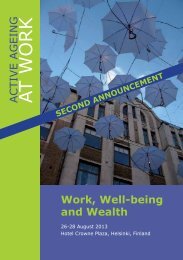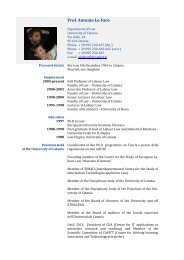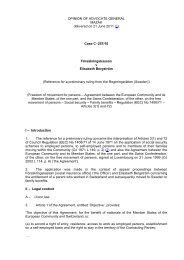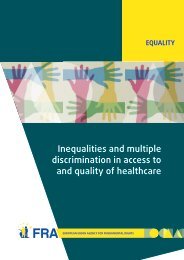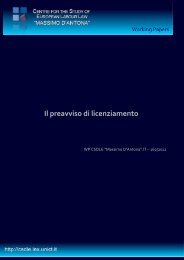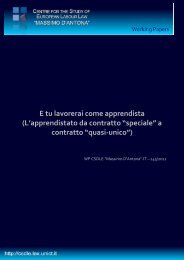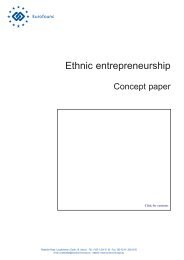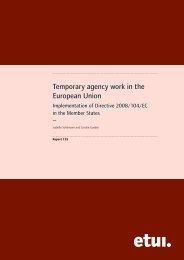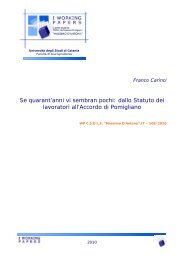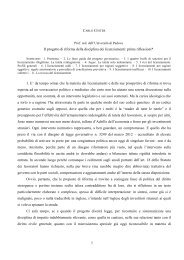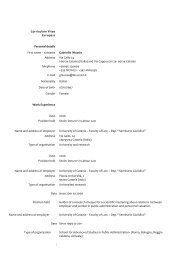Study on non-legislative initiatives for companies to promote gender ...
Study on non-legislative initiatives for companies to promote gender ...
Study on non-legislative initiatives for companies to promote gender ...
Create successful ePaper yourself
Turn your PDF publications into a flip-book with our unique Google optimized e-Paper software.
Gender equality <strong>initiatives</strong> 77<br />
services were cut and women were relegated in<strong>to</strong> traditi<strong>on</strong>al roles. In Hungary and the<br />
Czech Republic measures combating <strong>gender</strong> inequalities in the workplace are often<br />
c<strong>on</strong>nected with the rec<strong>on</strong>ciliati<strong>on</strong> issue. There are the following prizes <strong>for</strong> <strong>companies</strong><br />
which are active in the field of rec<strong>on</strong>ciliati<strong>on</strong> of family and work.<br />
In Hungary, by establishing the prize “Családbarát munkahely díj” pályázat (family<br />
friendly workplace award), the government realised that the fulfilment of work-life<br />
balance is not simply an individual goal, but also a societal target. The award was<br />
announced <strong>for</strong> the first time in the year 2000 by the Ministry of Family and Social<br />
Affairs. Since 2006, the working group ‘Rec<strong>on</strong>ciliati<strong>on</strong> of family and work’, operated by<br />
the Ministry of Social Affairs and Labour and c<strong>on</strong>sisting of NGOs, is also actively<br />
participating in the evaluati<strong>on</strong> and development of the competiti<strong>on</strong>. The Ministry of<br />
Social Affairs and Labour publishes the call <strong>for</strong> applicati<strong>on</strong> each year.<br />
The call <strong>for</strong> applicati<strong>on</strong> c<strong>on</strong>centrates <strong>on</strong> the following categories of <strong>companies</strong> and<br />
instituti<strong>on</strong>s: micro enterprises, small enterprises, medium-sized enterprises, large<br />
<strong>companies</strong>, public instituti<strong>on</strong>s and n<strong>on</strong>-profit organisati<strong>on</strong>s. Until 2007, the following<br />
fields were evaluated by the experts: working time, training, reintegrati<strong>on</strong> (women) after<br />
parental leave, subsistence of childcare instituti<strong>on</strong>s, available allowances, and<br />
employees’ security. In 2008, the call <strong>for</strong> applicati<strong>on</strong> became more comprehensive, and<br />
now includes <strong>gender</strong> (in)equality in the workplace.<br />
The questi<strong>on</strong>naire <strong>for</strong> the applicants is about the enterprises’/instituti<strong>on</strong>s’ family friendly<br />
measures in the following areas: employee-related in<strong>for</strong>mati<strong>on</strong>, equal opportunities in<br />
the workplace (e.g. knowledge of legal duties, use of affirmative acti<strong>on</strong>s), family friendly<br />
policies and practices (flexible organisati<strong>on</strong> of work, measures <strong>for</strong> creating work-life<br />
balance), organisati<strong>on</strong>al strategy <strong>for</strong> setting up family friendliness and appearance of<br />
family friendliness in the company communicati<strong>on</strong>. The submissi<strong>on</strong> of the applicati<strong>on</strong> is<br />
completed by an examinati<strong>on</strong> <strong>on</strong> the spot that entails an interview with the (<strong>to</strong>p)<br />
manager of the company or the leader of the organisati<strong>on</strong>, and also with employees. An<br />
independent team of experts selects the best enterprises/instituti<strong>on</strong>s. Final decisi<strong>on</strong> is<br />
made by a committee, and since 2008, local m<strong>on</strong>i<strong>to</strong>ring is also part of the decisi<strong>on</strong><br />
making process. A detailed list regarding the evaluati<strong>on</strong> process and dimensi<strong>on</strong>s is<br />
downloadable <strong>to</strong>gether with the applicati<strong>on</strong> <strong>for</strong>m. The winners of the competiti<strong>on</strong> are<br />
entitled <strong>to</strong> keep the ‘Family-friendly workplace’ title and award <strong>for</strong> a year.<br />
The Czech Republic seems <strong>to</strong> face similar challenges like Hungary, as child care<br />
facilities were disappearing in the 1990s and it became comm<strong>on</strong> <strong>for</strong> women <strong>to</strong> spend<br />
many years <strong>on</strong> maternity leave which until now has an enormous effect <strong>on</strong> their<br />
professi<strong>on</strong>al careers.<br />
The Czech prize is called “Firma roku: rovné příleži<strong>to</strong>sti” (company of the year:<br />
equal opportunities). It addresses both work-life balance but also women in management<br />
(see the following secti<strong>on</strong> regarding women in leading positi<strong>on</strong>s). The initiative is<br />
supposed <strong>to</strong> motivate <strong>companies</strong> <strong>to</strong> start implementing equality measures especially<br />
targeting work-life balance <strong>for</strong> both parents, but also the representati<strong>on</strong> of women in<br />
management. At a more general level, it also targets <strong>to</strong> influence discourses about<br />
women and motherhood and work, since it is still the prevailing opini<strong>on</strong> that women<br />
have <strong>to</strong> choose either children or career and that a mother has <strong>to</strong> stay home with her<br />
child at least <strong>for</strong> three years.



